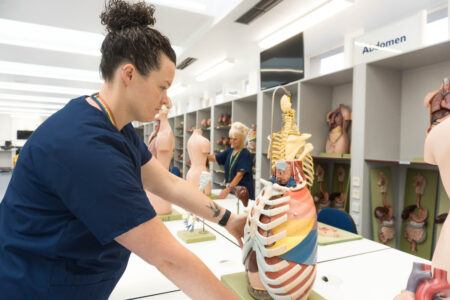
Clean air. Safe workplaces. Healthy communities. Across the world, the need for environmental and occupational health experts has never been greater. From tackling climate change to preventing workplace hazards, this field is shaping the future of public health — and a US degree is your key to joining the movement.
The nation is filled with qualifications that can double as a passport to impact, innovation, and a career that knows no borders — all thanks to a growing demand. The US Bureau of Labor Statistics projects a 7% growth in employment for environmental scientists and specialists from 2023 to 2033, outpacing the average for all occupations. This rising number is driven by heightened public awareness of environmental hazards and the need for sustainable practices across industries.
Hence, top universities are welcoming students from around the globe to leverage their comprehensive curricula, state-of-the-art research facilities, and emphasis on interdisciplinary learning. Amongst the lineup, three instituitions exemplify excellence in producing the next generation of leaders to safeguard our planet and its inhabitants.
University of Nebraska Medical Center

The University of Nebraska Medical Center offers MPH concentrations in Biostatistics, Emergency Preparedness, Epidemiology, Health Promotion, Maternal and Child Health, as well as Public Health Administration and Policy. Source: University of Nebraska Medical Center
As the state’s first medical college, the University of Nebraska Medical Center (UNMC) has been solving some of the world’s most pressing public health challenges since 1869. Today, it is home to six colleges, over 4,700 students, and a stand-out graduate programme focused on improving the air we breathe, the water we drink, the places we work, and everything in between — it’s called the Master of Public Health (MPH) in Occupational and Environmental Health.
With a strong foundation in toxicology, ecological health, and, of course, occupational safety, it can train you to assess and address health risks in the environment and workplace. Throughout, emphasis is placed on the unique challenges of agriculture, industry, and public health. It’ll also arm you with a deep understanding of environmental hazards and the skills to create solutions that protect workers and communities.
Perhaps the biggest perk of all is that the UNMC’s MPH offers the flexibility to fit your career goals — whether full-time or part-time, on-campus or online. No matter the path you take, the outcomes are clear. Past graduates land impactful roles in research, policy, and global health, shaping safer workplaces, healthier environments, and stronger public health systems. Success across sectors is common for MPH students who focus less on studying environmental and occupational health and more on applying it in real-world settings.
This programme will connect you to renowned research centres like the Global Centre for Health Security — the nation’s only federal quarantine unit and a state-of-the-art biocontainment training centre. In the Central States Centre for Agricultural Safety and Health, you’ll collaborate with industry leaders, public health agencies, and policymakers to reduce workplace injuries, prevent exposure to hazardous materials, and improve overall agricultural health. If you’re more interested in advancing solutions for issues like extreme weather events and waterborne diseases, look into the Water, Climate, and Health Programme, which drives interdisciplinary research to understand and mitigate public health risks linked to water quality and climate change.
Learn more about putting knowledge into practice where it matters most — apply to UNMC today.
University of California, Irvine

The Department of Environmental and Occupational Health is housed within UC Irvine’s Wen School of Population and Public Health. Source: University of California, Irvine
The Department of Environmental and Occupational Health at the University of California (UC), Irvine, is a leader in research, training, and advocacy. One of the few academic departments in the region dedicated to this field, it can equip you with the expertise to tackle pressing global health challenges — pollution, workplace hazards, and climate-driven health risks.
One of the ways it achieves this is through its Master of Public Health (MPH) in Environmental and Occupational Health, which will prepare you to assess environmental risks and develop solutions for real-world health concerns.
This STEM-designated programme covers critical topics such as air and water quality, toxicology, climate change, and the impact of environmental pollutants. On this route, you will even gain hands-on experience evaluating public health risks, from emerging contaminants like PFAS to extreme heat events and environmental justice issues.
If you’re seeking a research-intensive option, the Master of Science in Environmental Health Sciences builds on UC Irvine’s 40-year legacy of excellence in toxicology and environmental health research. With a curriculum rooted in exposure science, risk assessment, and epidemiology, you’ll develop specialised expertise in fields such as pulmonary toxicology, neurotoxicology, radiation toxicology, and molecular carcinogenesis.
On either programme, you will gain access to one of the department’s key pillars — the Centre for Occupational and Environmental Health (COEH), a state-mandated hub for research, training, and public outreach. The exposure you’ll gain will be invaluable — the centre often extends its expertise beyond the university, working with government agencies, industries, schools, and health professionals to improve awareness and prevention of workplace and environmental hazards.
City University of New York
The CUNY Graduate School of Public Health and Health Policy (CUNY SPH) is the top public health school in New York State and the tri-state area. Known for its strong commitment to health equity and social justice, it leads in education, research, and advocacy, addressing the evolving challenges of public health worldwide.
Amongst a lone lineup of graduate degree programmes, the MPH in Environmental and Occupational Health Sciences stands out. Designed to equip you with the skills to analyse and control environmental and workplace hazards, the programme emphasises a scientific approach to risk assessment, exposure measurement, and health outcomes — all of which can prepare you to develop innovative solutions that improve public health in both urban and industrial settings.
On this route, you can tailor your studies by choosing one of four specialised focus areas: climate change and health preparedness, environmental and occupational epidemiology, geospatial environmental health, or occupational health and safety.
If you’re more interested in Industrial Hygiene, the MS in Environmental and Occupational Health Sciences provides advanced training in assessing and mitigating workplace hazards. With this programme, you’ll develop the technical expertise to evaluate environmental exposures in settings ranging from offices and schools to factories and industrial sites, ensuring safe and healthy work environments across all sectors.
*Some of the institutions featured in this article are commercial partners of Study International










